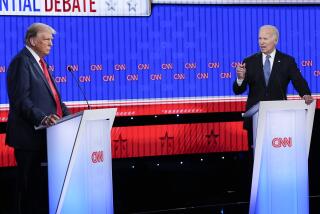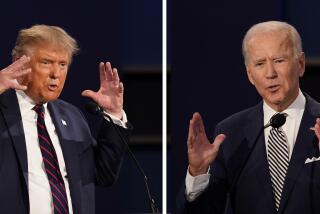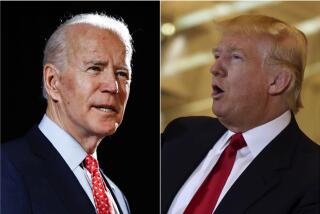Clinton, Heating Up Duel for West, Taunts Bush on Debates : Democrats: Candidate tells workers at a defense laboratory he supports non-military research to expand workloads.
- Share via
ALBUQUERQUE — Continuing a head-on duel for votes in the West, Democrat Bill Clinton on Friday taunted President Bush for rejecting a proposed debate between them next week, saying: “When it’s time to go man-to-man, plan-to-plan, where is he?”
Clearly intending to needle the President as he sought support in New Mexico--a state considered a toss-up--Clinton mocked Bush as “a great veto-er” who now has vetoed the general election campaign’s first scheduled debate because he is trying to “hide from a record that’s given this country the worst economic performance in 50 years.”
And to further pressure Bush on the issue, Clinton’s campaign launched a series of 60-second radio ads in Michigan--where the candidate face-off was to be held next Tuesday--urging voters there to “tell George Bush it’s time to debate.”
Bush, for his part, planned to spend part of his weekend at the Camp David presidential retreat preparing for a debate with Clinton--despite the public standoff between their two campaign organizations over how it would be conducted.
The Bush campaign recently rejected the format offered by a nonpartisan commission, objecting to its proposal for a single moderator. Bush aides countered with a plan they forwarded directly to the Clinton campaign in which a panel of journalists would ask questions. But the Clinton camp has said the Republicans should deal with the commission.
The standoff notwithstanding, Bush this weekend intends to undertake intensive debate studies with White House Chief of Staff James A. Baker III, campaign Chairman Robert M. Teeter and Budget Director Richard G. Darman. Four years ago, Darman played the role of Democratic presidential nominee Michael S. Dukakis during Bush’s preparations for the 1988 debates.
Clinton’s New Mexico stop wrapped up a five-day Western swing that also took him to California, Utah, Oregon and Colorado. The Democrat is hoping to break a virtual lock that Republican presidential candidates have enjoyed in the West for more than 20 years. California, Colorado and New Mexico have been carried by the GOP in every election since 1968; recent polls, however, have shown Clinton leading in each state.
Clinton’s visit in Albuquerque included a stop at Sandia National Laboratories, where he promised to support non-military research aimed at expanding the facility’s workload. He also detailed some of his philosophical differences with businessman Ross Perot on how to reduce the federal deficit.
Meeting with about 200 workers at Sandia--a government-owned, contractor-operated lab--Clinton reiterated his plan to convert defense budget cuts he has proposed into spending in other areas. His plan, he assured his audience, would help push the nation’s weapons research laboratories toward such new, post-Cold War challenges as finding new technologies to contain nuclear proliferation and clean up the environment.
“I understand the pivotal role this lab and our other federal labs must play in the future,” Clinton said.
The Arkansas governor’s appearance at Sandia followed by just three days a Bush visit to the lab, during which the President called on Congress to shift $166 million saved by shutting down a South Carolina nuclear weapons project to new technologies designed to guard against nuclear proliferation.
Clinton’s Sandia stop continued something of a high-stakes political cat-and-mouse game, marking the second time this week he has made a campaign appearance close on Bush’s heels.
On Tuesday, Clinton spoke to a National Guard Assn. meeting in Salt Lake City immediately after Bush, prepared to defend his actions in avoiding the draft during the Vietnam War. He ended up not discussing the matter because Bush did not bring it up.
Paul Begala, a Clinton strategist, said of the candidate appearing in Bush’s wake: “Some of it is by design, some of it is coincidence.”
Clinton discussed his differences with Perot in response to a question from a Sandia worker. He characterized as too drastic Perot’s tough economic proposals that are aimed at virtually eliminating the budget deficit within four years.
At a time of high unemployment and declining incomes, Clinton said, Perot’s prescription could lead to “a bigger recession in the next four or five years.”
Clinton added that “if you try to drag the economy down too much, all the revenue estimates are off and you’ve still got a big deficit.”
Clinton said he favors “a disciplined program” that would halve the deficit over the next four years, largely by bringing health care costs in line with the rate of inflation and through his conversion plan for defense spending.
Perot, who in July decided against launching an independent presidential bid, of late has been tacitly threatening to again actively campaign if, in his view, neither Bush nor Clinton seriously addresses the deficit issue. The Texan is now listed as a presidential candidate on the ballots of all 50 states.
As Clinton talked of the Sandia lab’s potential contributions toward finding new technologies to slow and monitor the proliferation of nuclear, biological and chemical weapons, he raised the specter of Saddam Hussein acquiring such arsenals.
That danger, he said, is “the biggest threat we will face in the future,” adding that Saddam’s apparent willingness during the Persian Gulf War to suffer losses at a rate of 1,000-to-1 suggests that the Iraqi leader would be predisposed to use weapons of mass destruction.
On other defense issues, Clinton reiterated his support for smaller but “well-trained and motivated” armed forces that integrate the reserves and the National Guard.
From Sandia, Clinton went to a rally at the University of New Mexico, where he focused on the flap over debates.
Clinton said of Bush: “He loves those tightly controlled debates where his Republican handlers can give him those one- or two-liners that he can use to beat up his opponents with and then be on the evening news.”
The Democrat added: “He’s hiding from an honest discussion of a record that he’d like to hide from. We should all be open to have our ideas tested in a forum of public debate.”
The day found the Clinton campaign still talking about the draft issue, although the governor himself avoided the controversy.
Campaign officials distributed to other members of the press a story in the Washington Post on Friday reporting that a letter critical of Clinton’s efforts to avoid the draft had actually been written by Linda Burnette--a sometime Republican activist in Arkansas--based on interviews with her ailing father, retired Col. Eugene Holmes, the former chief of the Reserve Officer Training Corps program at the University of Arkansas.
As part of his effort to avoid the draft, Clinton signed up for but then did not join the Arkansas ROTC program. Holmes signed the letter that surfaced this week criticizing Clinton for those actions.
Clinton adviser Begala dismissed the letter as “another attempt” by the Bush campaign to divert attention from the nation’s economic problems.
The Republican campaign has denied having any link to the letter. A senior Bush campaign policy adviser, David Tell, acknowledged that he had received a copy of the affidavit over the weekend. But Tell said he had merely filed the document and that neither he nor anyone else in the campaign had distributed it or assisted in its drafting.
Times staff writers James Gerstenzang, reporting from Basking Ridge, N.J., and Douglas Jehl, reporting from Washington, contributed to this story.
More to Read
Get the L.A. Times Politics newsletter
Deeply reported insights into legislation, politics and policy from Sacramento, Washington and beyond. In your inbox twice per week.
You may occasionally receive promotional content from the Los Angeles Times.









